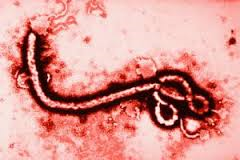Everyone should read the Op-Ed piece September 11 in the New York Times titled What We’re Afraid to Say About Ebola.
The author, Michael T. Osterholm, suggests two possibilities.
One is that Ebola travels to other large cities in the developing world, where poor sanitary and crowded conditions are common. This would be very bad.
The second possibility is that –
… an Ebola virus could mutate to become transmissible through the air. You can now get Ebola only through direct contact with bodily fluids. But viruses like Ebola are notoriously sloppy in replicating, meaning the virus entering one person may be genetically different from the virus entering the next. The current Ebola virus’s hyper-evolution is unprecedented; there has been more human-to-human transmission in the past four months than most likely occurred in the last 500 to 1,000 years. Each new infection represents trillions of throws of the genetic dice.
If certain mutations occurred, it would mean that just breathing would put one at risk of contracting Ebola. Infections could spread quickly to every part of the globe, as the H1N1 influenza virus did in 2009, after its birth in Mexico.
Why are public officials afraid to discuss this? They don’t want to be accused of screaming “Fire!” in a crowded theater — as I’m sure some will accuse me of doing. But the risk is real, and until we consider it, the world will not be prepared to do what is necessary to end the epidemic.
In 2012, a team of Canadian researchers proved that Ebola Zaire, the same virus that is causing the West Africa outbreak, could be transmitted by the respiratory route from pigs to monkeys, both of whose lungs are very similar to those of humans. Richard Preston’s 1994 best seller “The Hot Zone” chronicled a 1989 outbreak of a different strain, Ebola Reston virus, among monkeys at a quarantine station near Washington. The virus was transmitted through breathing, and the outbreak ended only when all the monkeys were euthanized. We must consider that such transmissions could happen between humans, if the virus mutates.
This would be a planetary threat, much like the huge flu epidemics.
Here is a recent BBC program with an hour length documentary and discussion of cures – which appear to exist at least in part.
Ebola The Search for a Cure BBC 2014
Priorities
I’ve got to say that this outbreak and its threatened spread to much wider populations in Africa and perhaps elsewhere – without much being done from the United States or from European countries (or Japan and China) highlights a huge problem with priorities.
The World Health Organization (WHO) has indicated that the actual numbers of infected persons and deaths are likely to be an order of magnitude larger than are reported. And the outbreak is by no means contained, but seems to be on the verge of causing complete social breakdown in some areas.
At some point, perhaps when the number of infected grows from maybe 20,000 to 200,000, people will have to wake up. President Obama has acknowledged that the real danger is mutation. The chances of mutation increase as the number of infected persons increases.
